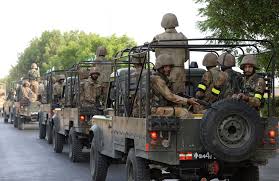The acting prime minister declared lately that we need to “move on” because the country had “accepted” the election results. Respectfully, this looks like an overly optimistic interpretation of an extremely complex scenario.
The large number of petitions being filed in opposition to the results shows that very few people are interested in “moving on.” Some stakeholders find the findings so appalling that political adversaries are even putting aside their differences to attack them as one. Similarly, it is a faulty framing of a very serious issue for the PM to dismiss concerns about manipulated results based on the oversimplified claim that people “believe that rigging was committed because the mobile service was suspended and results were delayed by 36 hours.” In his effort to disprove critics, the PM simply ignored the odd behaviour of numerous returning cops, which is far more relevant to the rigging allegations.
The PM shouldn’t be standing up for the ECP and its glaringly inadequate handling of the electoral process, regardless of whether he believes it to be his “moral duty. Furthermore, it doesn’t seem right that he is brushing off the worries of election tampering, especially in light of the fact that electoral tribunals and courts are receiving these complaints.
Furthermore, it appears reckless of him to hold political parties accountable for the contentious nature of the polls by accusing them of “failing to enact effective legislation” rather than allowing them to address the issue with the ECP. The fact that Mr. Kakar is still struggling to define what “free and fair” implies is equally peculiar. The populace won’t, however, be gaslighted into taking less than they are due. If the ECP is unable to arrange a seamless handover of power from one elected government to the next, it would be held responsible.
The media, which merely carried out its duty by serving as a check on the counting process, is not to blame for the escalating scandal surrounding election cheating; rather, it is only its catastrophic mishandling of the process. This is a basic fact that the administration should acknowledge and move on.
He said to a foreign interviewer the evening before the election that he “could not guarantee” free and fair polling since the concept was “very subjective.” He is now adamant that everyone who disagrees with this evaluation is mistaken and that the “process” was impartial and free.
A leader who has been elected by the people and is comfortably in office may be more likely to ignore such unjustified confidence and contempt for the consequences.
They do, however, appear a little startling coming from someone who is only given one task to complete in the office. Yes, the country will move on in due course. The political system will adapt and overcome its current problems.







